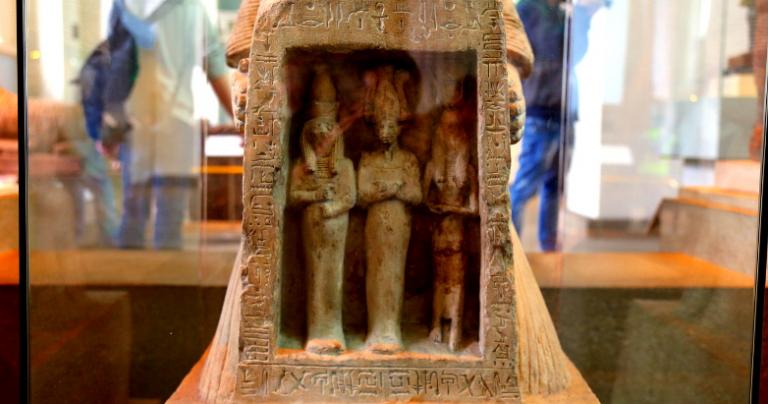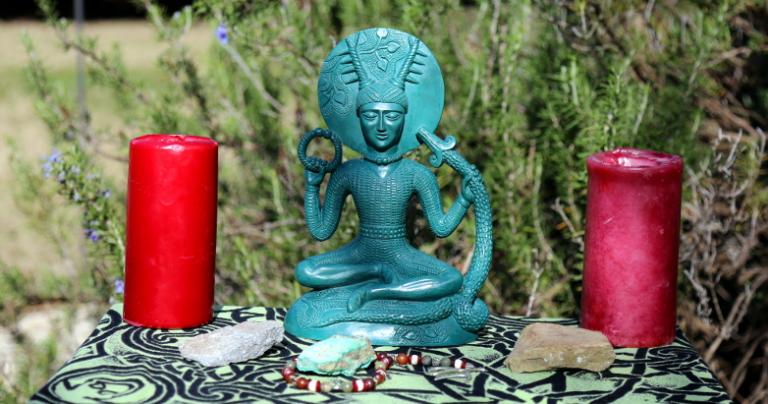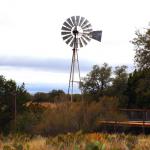In the recent post Toward Deeper Rites: The Obligations of our Seasonal Celebrations, I wrote:
Imbolc is for Brighid and Lughnasadh is for Lugh, but when do we fulfill our obligations to Cerridwen or Cernunnos or Athena? … If a God is important to you, They should have Their day at some point. There may be historically appropriate days, but if not, pick one. Establish your own liturgical calendar.
Then on the Patheos Evangelical channel, I found this post titled When Did Evangelicals Start Observing Lent? It brought back memories of my Baptist childhood, where I felt like I was missing out on the “real” Christianity because the only elements of the liturgical calendar my church observed were Christmas and Easter. Everything else was “too Catholic” and therefore to be avoided. Apparently some Evangelicals have decided otherwise – good for them.
The idea of a liturgical calendar – a list of holy days, feast days, and other special rites – is far older than Christianity. The Egyptians had one. So did the Romans and Greeks. Modern Paganism has the Wheel of the Year and that’s a good start, but it’s not enough – particularly for polytheists.
Liturgical calendars provide a framework for worship and for contemplation. They provide special days so we aren’t always bogged down in routines that can be laborious even if they are necessary and helpful. And they remind us of the cyclical nature of time.
As I’ve grown deeper into this Pagan polytheism I practice, I’ve felt the need for a more complete liturgical calendar. Some traditions already have them, but many – including my own – do not. So I’ve started building one. You can too.
Start with the Wheel of the Year
The Wheel of the Year is ubiquitous in modern Paganism. If you don’t already have something else, this is a great place to start.
We know the Celtic societies celebrated the four fire festivals: Imbolc, Beltane, Lughnasadh, and Samhain. There is no clear evidence they also celebrated the four solar festivals: the Spring Equinox, Summer Solstice, Autumn Equinox, and Winter Solstice. Newgrange and Stonehenge are aligned to the Winter Solstice, and Knowth is aligned to the equinoxes (we think). But these ancient monuments had been built (in the case of Stonehenge, multiple times) and abandoned long before Celtic culture arrived in Britain and Ireland.
But other European Pagan societies did celebrate the solstices and equinoxes. And whether you stick with the traditional associations or adapt it to your location, the Wheel of the Year provides a good way to mark the changing seasons. This is particularly true if you observe it as a set of seasons and not just as eight special days. The season leading up to Imbolc is a time for introspection and contemplation. The season leading up to Ostara is a time of preparation. The season leading up to Samhain is a time to honor our ancestors and to contemplate death, and so on.
Add a day for each of your Gods
Resist the urge to cram everyone onto the Wheel of the Year. The Gods deserve Their own days when They’re the center of attention, not just “who we’re going to call this time.”
Do some research. There may have been an appropriate festival at some time in antiquity. Some key event in Their mythology may be tied to a particular day, or a particular season. Do you remember the day They made Themselves known to you, or the day you swore an oath to Them? The more closely you can tie your celebration to a significant, auspicious day the better.
Who should be on your calendar? Certainly any deity with whom you have a devotional relationship, whether it’s as a priest, devotee, follower, or some other arrangement. I would add anyone who I’ve asked for significant favors, or who has asked me for significant service. If in doubt, start small and add others later.
Whatever you do, don’t commit to something you can’t or won’t do. If you promise to give a God a festival day, do it.
Add a day for ancestors, Nature spirits, and other spiritual allies
Are there ancestors – of blood or of spirit – whose birthday or death day or date of a significant accomplishment you need to observe? What about the spirits of the place where you live? Ideally you’ll be in constant contact with them, but just as you celebrate birthdays and anniversaries with family members you talk to every day, it’s good to have special days for important spirits.
If secular holidays are important to you (Thanksgiving, Memorial Day, Veterans Day, etc.) add them to your calendar too. If they’re not important to you, or if you have issues with what they commemorate (as some people have with Thanksgiving) then don’t.
Add your own day
Note that I said to add your own day, not days. The purpose of a liturgical calendar is to provide a framework for the worship of what’s most important, and for maintaining relationships with our spiritual allies. If you add four or five “me days” that puts the focus on yourself.
But if there’s a day that’s important to your spiritual life, add it to your calendar. The date of your first initiation, the date of the oath you took to your patron deity, the date of an epiphany or some other religious experience that put you firmly on this path – those are things worth celebrating. By commemorating them, you remember them and relive them, and you reaffirm the importance of what happened in your life. They are an auspicious time to renew your commitment to your Gods and your tradition.
What to do on these days
Holy days aren’t called “festivals” and “feasts” for nothing. These are special days – do special things. Adding one more offering or one more 15 second prayer to your daily or weekly routine isn’t enough.
Perform a special ritual. It’s okay to use your usual ritual format (such as ADF’s Core Order of Ritual), but make the person or event you’re celebrating the main focus. And remember – this is a time to honor them, not to ask them for favors (unless it is – that was/is the focus of some religious festivals).
Wear special clothes, play special music, eat special foods. This is especially true if you’re honoring an ancestor you knew in life and you remember what they liked. Pagans often say “that which is remembered, lives.” I believe life continues after death whether we are remembered or not, but remembering our honored dead makes them alive for us, and that’s a very good thing – for us and for them.
If you’re solitary, celebrating a festival can be harder to do than if you’re working in a group. Holidays are always better when they’re celebrated with friends and family. If you have a group of eight, you may want to hold a fancy banquet. If it’s just you, maybe it’s one special dish. But whatever your situation, make it special.
Consistency, consistency, consistency
The worst thing you can do is to make a bunch of commitments and then drop them because things get hard. It may feel good to create an elaborate liturgical calendar with two or three celebrations and observances every week, but the real benefit comes from using the calendar, not from making it. Start small: the Wheel of the Year and four or six or eight other dates. Once you get in the habit of performing the rituals every time, you can add more.
What happens if life interferes and you just can’t observe an upcoming festival? People get sick, work and family make demands on our time – sometimes at the last minute. And sometimes, stuff just happens.
Ask yourself “would this be enough to make me miss my child’s birthday?” If the answer is yes, cancel or reschedule and move on. If you just can’t do it, you can’t do it. But if you’d find a way to be there for your kid one way or another, find a way to be there for your Gods and ancestors.
Understand that the deeper you go, the less acceptable excuses become. But you’ll learn that in your own time.
If you are lucky enough to belong to a tradition that already has a liturgical calendar, observe it with gratitude and enthusiasm. But if you don’t, build your own. It will help you deepen your worship and practice.



















